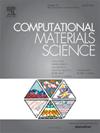Tepkit:一个用于测量和可视化原子间力常数和加速传输属性计算的工具包
IF 3.3
3区 材料科学
Q2 MATERIALS SCIENCE, MULTIDISCIPLINARY
引用次数: 0
摘要
对能量转换和热管理的日益增长的需求使得对输运和热电性质的研究变得越来越重要。作为一种新兴的计算方法,高通量计算为快速评估材料性能提供了有效的手段。然而,用于构建计算传输属性的工作流的工具仍然持续短缺。在这里,我们介绍Tepkit,这是一个Python包,带有命令行界面,提供了一组有用的命令来加速和自动化从头计算工作流,用于计算和分析材料的传输和热电性质。Tepkit可以利用原子间力常数(IFCs)的均方根值来测量其强度,从而分析原子间的相互作用并预测合适的截止半径,从而加快高阶IFCs的计算。在常用的boltztrap - shengbte型工作流程中,自动化数据处理步骤,识别重复作业,高效获取结果,直接导出图形。本文介绍了该程序的主要特点,并通过一些示例演示了其功能。本文章由计算机程序翻译,如有差异,请以英文原文为准。
Tepkit: A toolkit for measuring and visualizing interatomic force constants and accelerating transport-property calculations
The rising demand for energy conversion and thermal management has made the study of transport and thermoelectric properties increasingly important. As an emerging method, high-throughput computing provides an efficient means to quickly evaluate material properties. However, there remains a persistent shortage of tools for building workflows to compute transport properties. Herein, we introduce Tepkit, a Python package with a command-line interface that provides a set of useful commands to accelerate and automate the ab initio calculation workflow for computing and analyzing transport and thermoelectric properties of materials. Tepkit can measure the strength of interatomic force constants (IFCs) using their root-mean-square values to analyze interatomic interactions and predict the appropriate cutoff radius, thereby accelerating the calculation of higher-order IFCs. It can automate the data-processing steps and identify duplicate jobs in the commonly used BoltzTraP–ShengBTE-type workflow to efficiently obtain results and directly export figures. This article introduces the main features of the program and demonstrates its functionalities with some examples.
求助全文
通过发布文献求助,成功后即可免费获取论文全文。
去求助
来源期刊

Computational Materials Science
工程技术-材料科学:综合
CiteScore
6.50
自引率
6.10%
发文量
665
审稿时长
26 days
期刊介绍:
The goal of Computational Materials Science is to report on results that provide new or unique insights into, or significantly expand our understanding of, the properties of materials or phenomena associated with their design, synthesis, processing, characterization, and utilization. To be relevant to the journal, the results should be applied or applicable to specific material systems that are discussed within the submission.
 求助内容:
求助内容: 应助结果提醒方式:
应助结果提醒方式:


